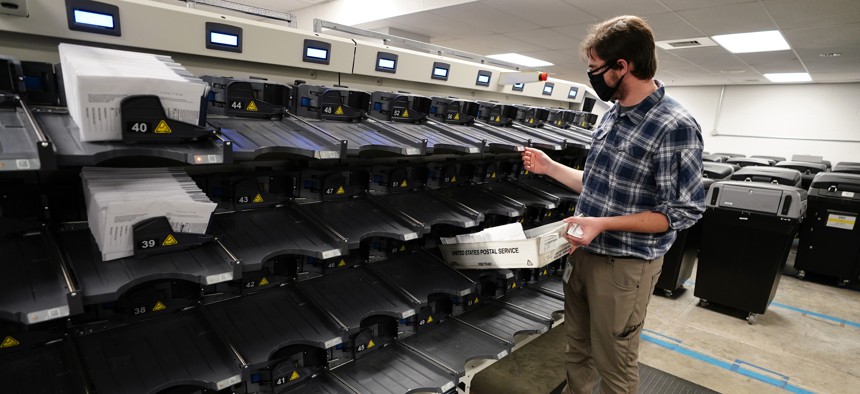Pennsylvania to Separately Count Late Mail-in Ballots

Michael Imms, with Chester County Voter Services, gathers mail-in ballots being sorted for the 2020 General Election in the United States, Friday, Oct. 23, 2020, in West Chester, Pa. AP Photo/Matt Slocum

Connecting state and local government leaders
STATE AND LOCAL ROUNDUP | Water pollution linked to increased health costs in Wisconsin… Remote learning may have inflated Nashville school test results… Florida Gov. Ron DeSantis had trouble voting this week.
The U.S. Supreme Court issued a pair of decisions Wednesday that blocked Republican efforts to prevent two key battleground states from accepting and counting absentee ballots for several days after Election Day. The court refused to decide before Nov. 3 whether election officials in Pennsylvania can continue to count absentee ballots for three days after the election. The court could still issue a ruling after the election, however, and local election officials are encouraging residents to drop off their ballots in person to ensure they are received by Election Day in case a subsequent decision were to disqualify them.
“Cast it now, do not wait,” said Pennsylvania Secretary of State Kathy Boockvar. “At this point, we are not recommending that anybody put their ballots in the mail. Just drop it off in person.”
Boockvar also advised counties to separate and set aside mail-in and absentee ballots that arrive after Nov. 3 so that they can be tallied separately for the sake of “effective and clear election administration in Pennsylvania.”
The court also let a lower court ruling stand that allows the North Carolina Board of Elections to extend the deadline for absentee ballots for nine days after the election. However, there is no order or recommendation in North Carolina that late-arriving ballots be kept separate. In each case, the deadline extensions were backed by Democrats and opposed by Republicans. [KDKA-TV, New York Times, SpotlightPA, Associated Press]
POLLUTION COSTS | The negative health impacts linked to nitrate pollution in drinking water are costing Wisconsin residents anywhere between $23 million and $80 million in medical expenses each year, according to a new report. Between 111 to 298 cases of colorectal, ovarian, thyroid, bladder and kidney cancer may be caused by nitrate contamination each year, said the report published in the journal Environmental Monitoring and Assessment. Between 26 to 149 cases of adverse birth outcomes, including low birth weight or very premature birth, may also be tied to nitrate exposure. About 10% of private wells sampled in Wisconsin exceed safe levels of nitrate in groundwater, 90% of which stems from agricultural runoff. The report found a 40% reduction in nitrates statewide would reduce associated medical costs by 22%. [Wisconsin Public Radio]
SCHOOL TESTS | The coronavirus pandemic has created another complication for schools—accuracy in standardized testing. The results from Metro Nashville Public Schools' annual Measures of Academic Progress assessment testing this fall appear to be “somewhat inflated,” with 4,104 kindergarten students scored almost twice as high as those tested last year, according to Paul Changas, executive director of research, assessment and evaluation for the district. The abnormal results may be due to help from well-meaning parents. When young students have trouble with the remote testing this year, family members may have stepped in to help them, leading to unreliable data on how well students are actually performing. [Tennessean]
WIND POWER | Maryland, North Carolina and Virginia announced a collaboration Thursday to advance offshore wind power projects in the Southeast and Mid-Atlantic region. The partnership will provide a framework for the three states to cooperatively promote, develop and expand offshore wind energy projects and the wind energy industry. Wind power projects in the pipeline along the Atlantic Coast are estimated to support up to 86,000 jobs, and to provide up to $25 billion in economic output by 2030. [Bay Net]
VOTER DATABASE TAMPERING | A 20-year-old Florida man was arrested on felony charges for allegedly changing the address of Gov. Ron DeSantis' address in the state's voter database, temporarily preventing the governor from voting this week. Authorities said Anthony Steven Guevara logged onto the Florida Department of State website and was able to change the address using the governor’s date of birth, which he obtained through a Wikipedia search. Law enforcement tracked down Guevara’s address by obtaining the IP address of the computer that sent the request and he was arrested Tuesday. He is charged with unauthorized access of a computer and altering a voter registration without consent. [Fort Myers News-Press]
Andrea Noble is a staff correspondent with Route Fifty.

NEXT STORY: DOD lays foundation for permanent, secure telework




